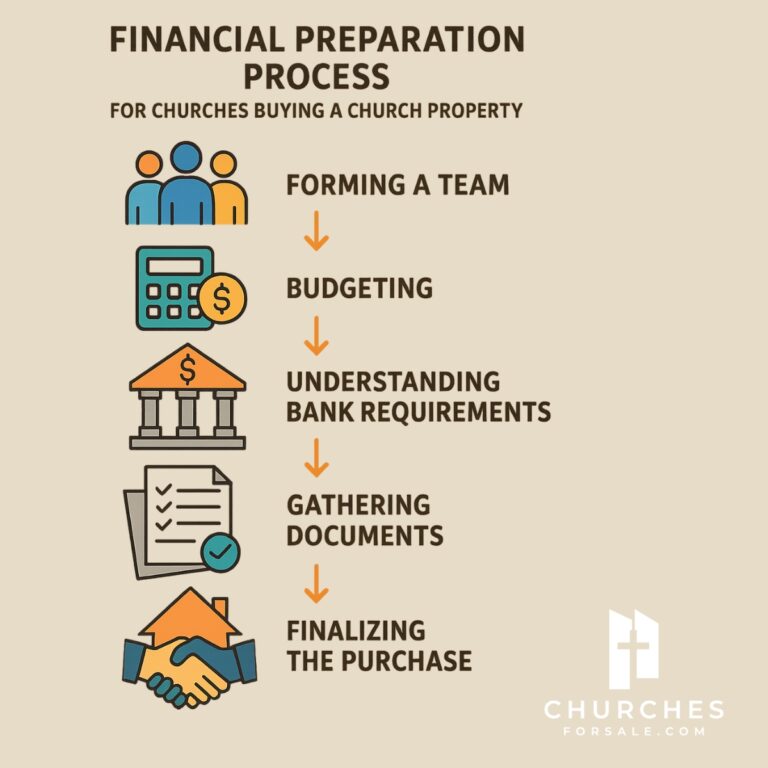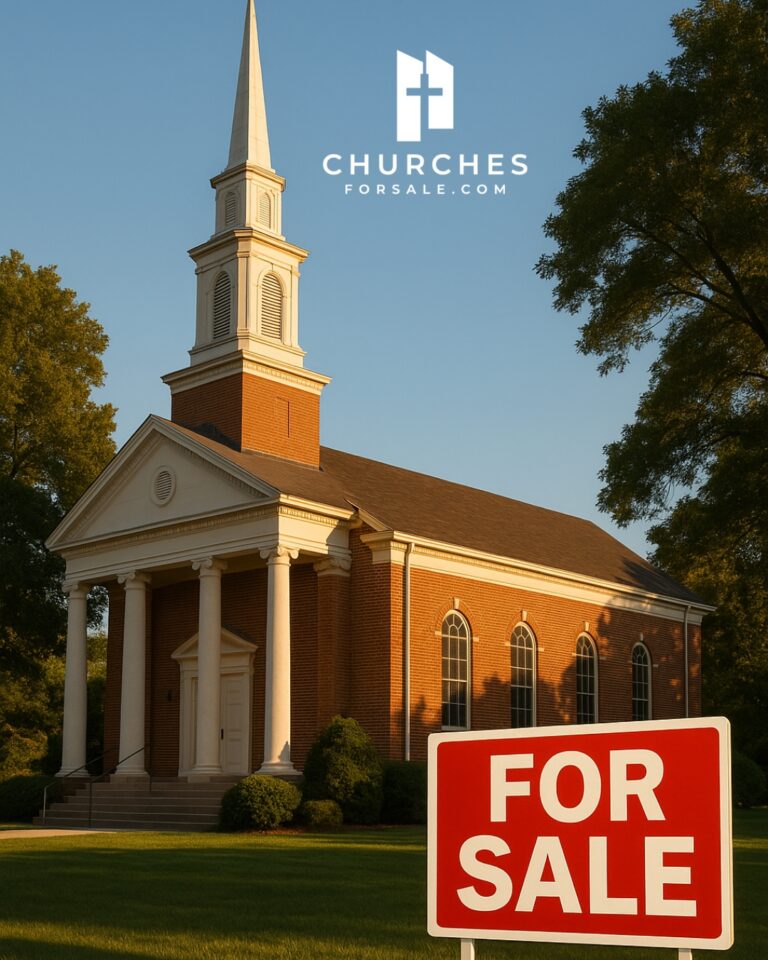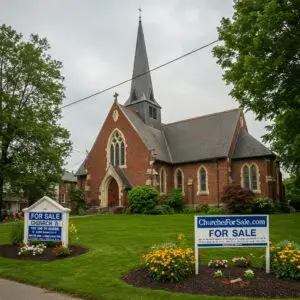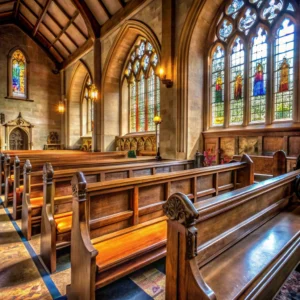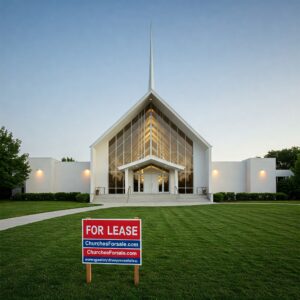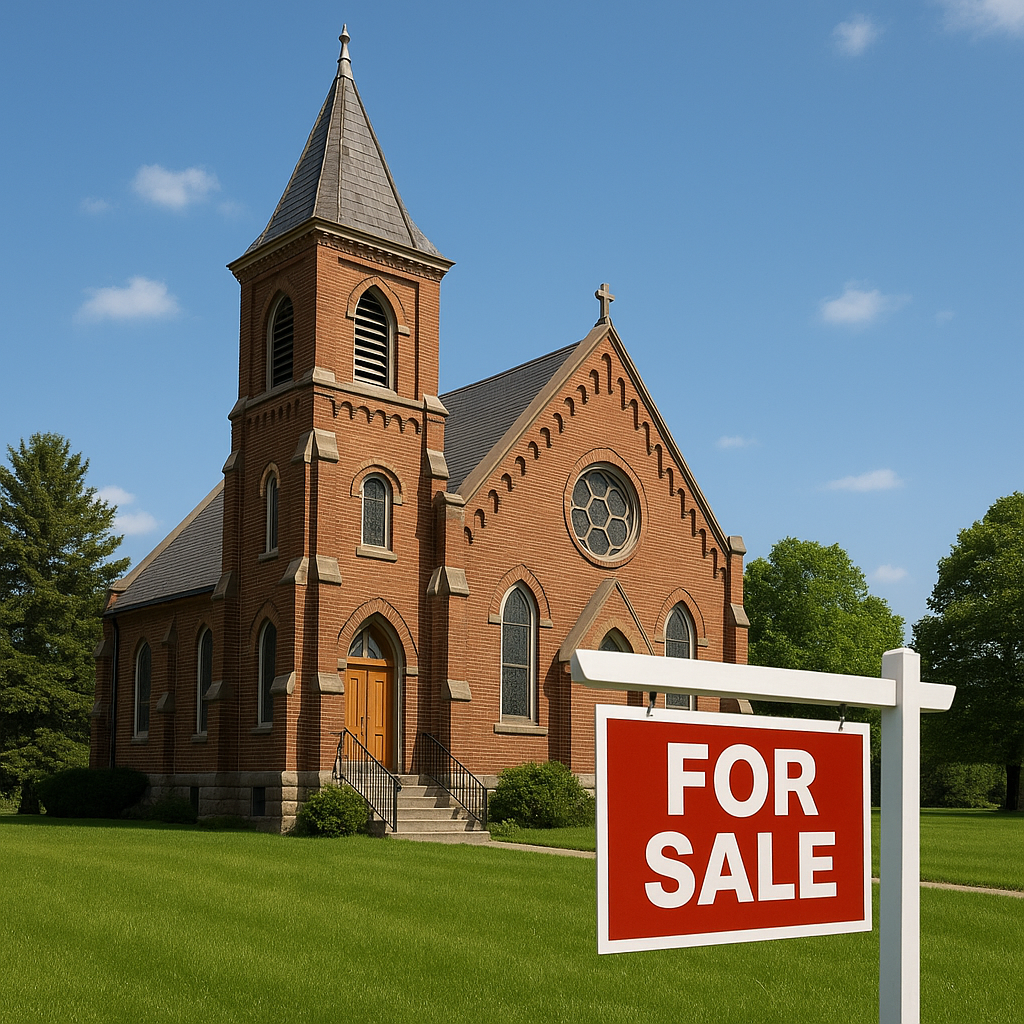
Who Really Owns That Church? The Legal Truth Behind Churches for Sale—and Who Can Sign the Deal
For any leader or real estate professional involved in a church for sale, understanding the nuances of property ownership can mean the difference between a smooth transition and a legal quagmire. The answer to who truly owns the building—whether it is the local congregation or the overarching denomination—rests within an intricate web of deeds, bylaws, denominational policies, and state law. Given the rising number of churches for sale, it is essential to clarify the legal landscape and identify the proper authority for such transactions. The stakes are high, as historical, financial, and spiritual concerns often intertwine during the process of a church property transfer.
This article sheds light on ownership, authority, and the best practices to ensure your church for sale transaction is authorized and valid.
Churches for sale across the United States and beyond have increasingly become topics of litigation and confusion, especially as congregations change course or denominations shift in policy. Local congregations often believe that since they have funded, maintained, and worshipped in the building for generations, the property belongs to them alone. On the other hand, denominational leaders or regional offices may assert legal ownership, citing trust clauses, denominational bylaws, or historical arrangements. With millions of dollars, community ties, and deep faith traditions at stake, courts have been asked to arbitrate property disputes—often with differing results. Navigating this legal grey zone requires a firm grasp of both church governance and state property law, especially during a church for sale transaction.
Matters become even more complex when considering the legal instruments involved in authorizing a church for sale, such as who must sign off and what procedures must be followed. In many cases, the specifics come down to a careful reading of church constitutions, property deeds, state statutes, and even federal First Amendment issues. This complexity is further heightened by the variability among hierarchical denominations—as seen in Catholic, Methodist, or Episcopal organizations—and congregational models like Baptist or non-denominational churches. Real estate professionals and church leaders will need to coordinate closely to verify authority, resolve disputes, and confirm all consents before proceeding. This article offers a comprehensive roadmap to safeguard your process when handling any church for sale, drawing from both hypothetical scenarios and recent court precedents.
Defining Ownership—Local Congregation Versus Denomination
The ownership of property in a church for sale transaction fundamentally depends on whether the congregation operates independently or within a denominational structure. In congregational models, the title often rests with the local church, which may act through trustees or a corporate entity established by the members. Bushore Church Real Estate says, “Not all churches own their property.” Conversely, in hierarchical or connectional denominations, property may be held in trust or outright by a regional or national body, despite what the deed sometimes implies. For instance, a Baptist church seeking to offer its building among churches for sale might vote in a congregational meeting to list the property, relying on its own governance documents to authorize the sale. However, a United Methodist congregation typically cannot proceed without express written consent from the denomination, due to explicit trust provisions in the denomination’s Book of Discipline.
Consider a hypothetical scenario involving a rural congregation known for its autonomy, which decides to seek buyers through churches for sale listings. Upon review, its board finds the deed is in the church’s name, with no mention of any higher body. The property was both funded and maintained by the local congregation, whose bylaws state that only a majority of members can authorize any sale. In this case, the sale would likely require only internal consent, provided the state’s nonprofit laws are followed. However, if the same deed contained a clause indicating ownership reverts to the denomination if the church closes, the situation could be drastically different.
The Episcopal Church offers another illustrative example, having detailed processes for approving a church for sale through parish vestries and diocesan standing committees. Here, the vestry may recommend the sale, but authoritative consent must be obtained from diocesan leadership—including in some jurisdictions, the bishop and the standing committee, and even civil court approval. As such, reviewing not only the organizational structure but also the specific language in deeds and denominational documents is crucial in every church for sale consideration.
Governing Documents—What to Review in a Church for Sale
When listing a church for sale, the single most important set of documents includes the property deed, the church’s corporate charter, its articles of incorporation, and any bylaws or trust clauses binding the congregation. The deed is a key starting point, as it often names the legal owner and may include reverter or trust clauses that dictate ownership upon a change in use or affiliation. In many denominations, especially hierarchical ones, broader governing documents like the Book of Discipline or diocesan statutes will contain clauses that can impact property rights, sometimes superseding what the local deed alone suggests. It is critical that professionals scrutinize these documents and cross-reference them to resolve the authority to list the church for sale and to complete a transaction.
Suppose a church council inquires whether it can independently list its building for sale after joining a different denomination. The council finds a clause in the deed stating, “so long as it is used as a Methodist church”—a classic reverter provision. Additionally, the denominational bylaws enforce an express trust requiring that property be held for the benefit of the Methodist church at large. In such a scenario, the church cannot simply proceed to list its property for sale without denominational approval, as any transaction in defiance risks future litigation and possible reversal. Even absent restrictive language in the deed, courts may look at the course of dealing and the church’s legal relationship with the denomination.
Another hypothetical involves a non-denominational church listed for sale where the deed is silent about any parent connection, and the bylaws clearly assign all property decisions to a majority vote of the congregation. Provided local and state laws are met, this church would need only internal approval, such as a special congregational meeting and appropriate resolutions. Real estate professionals should always request to review the full, current set of all such documents before advertising or entering into any contract for the church for sale.
State Laws and Civil Court Precedents—Their Role in Church for Sale Transactions
State law plays a consequential role in determining church property disputes, especially in churches for sale where internal governance is unclear or contested. Courts generally apply one of two principles: the “hierarchical deference” approach or the “neutral principles of law” approach. The former gives weight to the stated authority of the denomination, while the latter examines deeds, charters, and state statutes without delving into ecclesiastical matters. For example, under the neutral principles approach, a court would review whether the deed or trustees hold the title for the benefit of the denomination or the local congregation. In mixed cases, majority rule among the local membership may even decide who has the authority to place a church for sale.
In New Jersey, the power to sell church property is specifically vested in church trustees, but only upon authorization from the majority of the congregation at a duly noticed meeting. Other states may require approval by both local and higher church authorities, especially if the church operates under denominational bylaws with trust or reverter clauses. These statutes are designed to prevent unauthorized sales and protect the long-term interests of both the local body and the denomination. Failure to comply with statutory requirements can postpone or entirely invalidate a church for sale, as the court can rescind the transaction if proper procedures are not observed.
Hypothetically, suppose a regional judicatory challenges a completed sale by a local congregation, claiming the sale was unauthorized. The court would scrutinize state law, congregational bylaws, the deed, and any denominational trust clauses to determine which entity had authority over the church for sale. The resolution might differ across jurisdictions, emphasizing the need for thorough legal review and a carefully documented approval process in every church for sale transaction.
Authorization and Transaction Procedures for Churches for Sale
Even after determining ownership, obtaining proper authorization for a church for sale is an intricate process requiring adherence to corporate procedures, internal rules, and—often—higher denominational approval. In many congregational churches, the governing documents will specify a required vote, quorum, and notice period for a meeting to approve the property sale. In denominational contexts, higher consent is typically required by statutes or canonical law, which can include the bishop, standing committee, diocesan manager, or an equivalent authority. Real estate professionals must ensure all necessary consents, signatures, and resolutions are obtained before proceeding to closing to avoid any legal challenge later.
For example, an Episcopal parish may receive an attractive offer for its downtown property, listing the church for sale with the intent to relocate. The parish vestry votes unanimously to accept, but the diocese requires a formal application to the bishop and standing committee, including all transaction documents and a justification for the sale. The bishop, in consultation with legal counsel, may require further details or decline approval based on diocesan priorities, while civil authorities might mandate court approval depending on the property’s value. This comprehensive review ensures that fiduciary and missional responsibilities are balanced before any sale concludes.
Consider a similar scenario outside a denominational system, in an independent church. The congregation calls a special meeting with proper notice, the members approve the church for sale by a supermajority in compliance with bylaws, and the board enacts a formal resolution authorizing the transaction. The absence of denominational oversight accelerates the sale, provided all required nonprofit and real estate laws are met. As such, transaction procedures differ dramatically depending on the governance structure, with special care needed where trust clauses or denominational consents are involved.
Hypothetical Scenarios—Churches for Sale in Practice
Let us imagine a mid-sized Presbyterian church for sale in a major metropolitan suburb. The congregation is divided over remaining aligned with the denomination, leading to a decision to split. If the local church wishes to sell its property and realign, the court will likely look for whether the denomination holds a trust interest in the property through the Book of Order or whether the congregation alone appears on the deed. When the trust clause is clear and enforceable, the congregation may be forced to pay the denomination for release of the property or find a new space for worship.
A second scenario features an independent Pentecostal church for sale with no denominational connection. The congregation holds the property title outright and decides, via a unanimous meeting and proper procedural resolutions, to sell its aging building and invest in a modern facility closer to its members. Here, the process is straightforward—internal authority suffices, provided the sale adheres to applicable state nonprofit rules and any encumbrances on the property. By contrast, a Catholic parish must seek written permission and formal approval from the diocese, often including the bishop, finance council, and legal review, before its church for sale can proceed to closing.
Lastly, consider a Methodist church for sale in Texas whose deed refers to the property as “for the use of the United Methodist Church only.” The congregation votes to affiliate elsewhere, assuming it can transfer the property. But upon listing the building among churches for sale, denominational lawyers intervene, referencing the trust clause and the United Methodist Book of Discipline. Courts are then left to untangle the situation, often resulting in costly, drawn-out litigation or forced settlements.
When Disputes Arise—Litigation and Resolution in Churches for Sale
Disputes over churches for sale have, in recent decades, increasingly reached civil courts, especially as churches have split over theological disagreements or property values have appreciated. Courts generally avoid adjudicating doctrinal disputes but will analyze property documents and church governance under “neutral principles of law”. This means the decision often hinges on who holds legal title, what the governing documents say, and any trust provisions that exist. Major Supreme Court cases, such as Jones v. Wolf, have underlined that lower courts may not automatically defer to denominational authority, leading to inconsistencies across the country.
In practice, the courts will examine the chain of title, the language of the deed, any denominational trust clauses, and the congregation’s bylaws. Take, for example, a church for sale that closes a transaction without denominational consent, later facing litigation when the denomination demands reversal based on an overlooked trust clause. Such a dispute can result in the sale being rescinded, damages awarded, or the church being forced to vacate the premises—a costly and traumatic outcome for all parties involved. To mitigate such risks, all involved should perform comprehensive diligence before listing a church for sale or closing on a transaction.
Another example involves an internal dispute between factions within a single local church, each claiming authority to authorize a church for sale. If the bylaws or state law dictate majority rule, courts may determine that the majority of active, voting members decides the issue, regardless of smaller group claims. This further demonstrates why clarity of documentation, organizational procedures, and legal compliance are vital before marketing any churches for sale.
Best Practices for Real Estate Professionals and Church Leaders Navigating Churches for Sale
Given the complexity of church for sale transactions, a systematic approach is vital for both church leaders and real estate professionals. First, always conduct a complete document review, including deeds, articles of incorporation, bylaws, denominational statutes, and any trust clauses. Verify the chain of title and investigate any reverter or encumbrance that may affect the wording of “churches for sale” listings. Second, consult legal counsel experienced in nonprofit and ecclesiastical property law to navigate potential pitfalls, especially in transactions involving denominational oversight or disputed ownership.
Third, follow organizational procedures scrupulously, ensuring all meetings are properly noticed, documented, and that voting or consent requirements are strictly adhered to. For denominational churches, initiate early communication with regional and national authorities to clarify the process, gain needed approvals, and resolve any ambiguities before marketing the church for sale. As an example, a real estate professional listing an Episcopal church property should verify written approvals from both the vestry and the diocese, attaching resolutions from all relevant parties.
Finally, when in doubt, err on the side of transparency: communicate regularly with all stakeholders, disclose extra steps that may be required, and advise clients or sellers of possible delays due to consent or litigation. Real estate professionals who understand the legal and procedural labyrinth gain a distinct competitive advantage in the burgeoning churches for sale market. By rigorously following these best practices, both parties can dramatically reduce transaction risk while honoring the spiritual and financial stakes inherent in these special properties.
Conclusion
Navigating the legal complexities of a church for sale comes with unique challenges that set these transactions apart from conventional real estate deals. Both church leaders and real estate professionals must appreciate that the answer to who owns the property—and who must authorize its sale—will vary widely, depending on ecclesiastical structure, historical documents, and local law. This means that each church for sale demands careful, case-specific analysis, robust legal counsel, and strict procedural discipline. Each step, from document review to congregational votes and denominational consent, must be executed to the highest standard to ensure valid and lasting outcomes. The consequences of overlooking even one procedural or legal requirement can slow, complicate, or even unravel what should be a straightforward transaction.
Over recent years, countless hypothetical and real-life examples have revealed the tangled nature of church property ownership. Congregations have faced protracted, expensive litigation simply because of ambiguous deeds, overlooked trust provisions, or insufficient engagement with denominational authorities. The importance of due diligence cannot be overstated, as it provides vital protection against unexpected challenges or contested rights when listing a church for sale. Through diligence, thorough communication, and mutual respect, all parties can work toward solutions that respect the spiritual heritage as well as the financial value of these properties. Such care also protects the broader community, ensuring that historic church buildings transition responsibly to new uses or congregations.
Ultimately, the successful transfer of a church for sale demands cooperation, expertise, and above all, clarity—legally, organizationally, and spiritually. By embracing best practices and seeking expert guidance at each stage, church leaders and real estate professionals can steward their properties wisely and minimize risk to all involved. The unique legacy of every church building deserves this level of attention, ensuring that each church for sale transaction honors the faith and traditions of its past while equipping new ministries and owners for the future. With stakes that transcend mere bricks and mortar, each church for sale is both a profound responsibility and a unique opportunity. In the rapidly changing world of church property, knowledge is not just power—it is essential protection for all involved.
Sources - Resources - Disclaimers
I am not a legal expert in the area of church real estate, but have conducted a lot of research. Some of the research was done with help by AI to help find great resources to use in bringing this article to you. This article is meant to be educational in nature and we encourage everyone to verify facts and consult with your own legal counsel prior to any action.
Here are some of the sources that informed my writings in this article:
- Congregational Churches | Church Law & Tax
- Steps to Selling Church Property Responsibly
- Who Owns the Church’s Property? — Reynolds Law Group
- Does The Pastor Own The Church Building? – Churches Of Faith
- Disputes over Church Property | The First Amendment Encyclopedia
- SALE OF CHURCH REAL PROPERTY In the Episcopal Diocese of Long Island Policies, Procedures and Practices
- Church Property and Denominational Ownership
- Church Property Disputes—Dispute Resolution Procedures | Church Law & Tax
- Hierarchical Churches—Neutral Principle of Law
- 2024 New Jersey Revised Statutes Title 16 – Corporations and Associations, Religious Section 16:1-6 – Property; power of sale; authorization
- Property Law Considerations for Religious Facility Investors | MyEListing
- Who controls church property? | WORLD
- Ownership of Church Buildings | The Puritan Board
- The Ownership of Church Property: Denominational Trust Clauses and Civil Litigation – Dalton and Tomich
- “Who Owns My Church?” Seeking Supreme Clarification on Church Property Rights
- Church Property – Part 1
- Who Owns A Church Building? The Truth Will Shock You!


